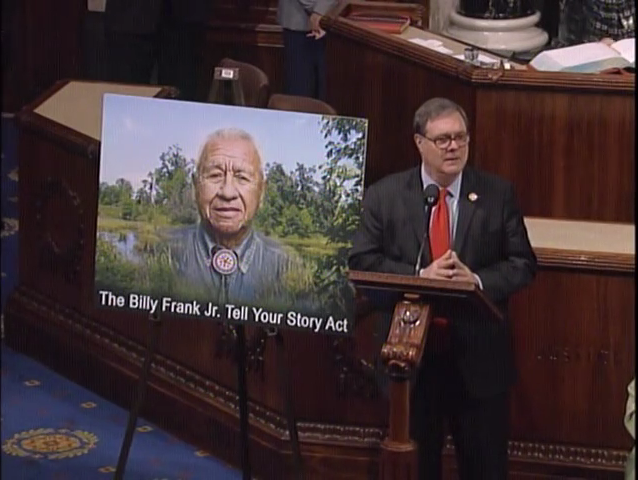
Submitted by The Office of Congressman Denny Heck
Today the House of Representatives passed the Billy Frank Jr. Tell Your Story Act by a vote of 413-2. The bill, H.R. 2270, previously advanced out of the House Natural Resources Committee by a unanimous vote, will now go to the U.S. Senate for consideration.
“Like many Washingtonians, I frequently pass the sign on I-5 indicating the way to the wildlife refuge,” Rep. Denny Heck said. “I cannot wait to make that drive and see the name of our friend Billy, who mattered so much to the health and welfare of our area. It will remind me of the special place we call home and the people that cared for its wellbeing. I would like to thank everyone, notably Indian Country, the Republican majority, and a unified Washington House delegation who joined together in this effort. This passage is a fitting tribute to Billy and the treaty rights he lent his advocacy to for a lifetime.”
Heck spoke on the House floor today during the debate on the bill, mentioning Billy’s advice to always “tell your story.”
“Billy was instrumental in helping to restore the Nisqually River watershed. Today it is one of the healthiest in the state. He didn’t do it alone – it took the work of many. But most of all it took cooperation of the kind that Billy helped to create everywhere he went. Naming the Nisqually Wildlife Refuge after Billy would be a fitting tribute to the man who loved that watershed so much,” Lorraine Loomis, Chair of the Northwest Indian Fisheries Commission, said.
Cosponsors include the entire Washington state Congressional delegation, Congressional Native American Caucus Co-Chairs Tom Cole (R-Okla.) and Betty McCollum (D-Minn.), Chair of Subcommittee on Indian, Insular and Alaska Native Affairs Don Young (R-Alaska), and Ranking Member of the House Natural Resources Committee Raúl Grijalva (D-Ariz.).
Earlier this month, Senator Maria Cantwell (D-Wash.) introduced companion Senate legislation, S. 2326, and President Barack Obama posthumously awarded Billy Frank Jr. the Presidential Medal of Freedom, saying “his magnetic personality and tireless advocacy over more than 50 years made him a revered figure both domestically and abroad.”
Background
Billy Frank Jr. was known as a tireless champion for treaty rights, tribal sovereignty, and salmon recovery. He was on the front lines in the campaign against state-imposed limits on tribal fishing, known as the Fish Wars in the 1960s and 1970s where he organized “fish-ins”—modeled after the sit-ins of the civil rights movement. Those efforts lead to the 1974 Boldt decision, which reaffirmed the Tribes’ rights to half of the fish harvest in Washington.
Billy Frank Jr. was awarded the Albert Schweitzer Prize for Humanitarianism and the Martin Luther King Jr. Distinguished Service Award, was nominated for the Nobel Peace Prize in 2010, and posthumously received the Presidential Medal of Freedom in 2015. As chairman of the Northwest Indian Fisheries Commission (NWIFC), Frank worked to bring together tribes, local, state, and federal officials to further strengthen treaty rights and environmental protection laws.
The Nisqually National Wildlife Refuge was established in 1974 to protect the Nisqually River Delta, a biologically rich and diverse area at the southern end of Puget Sound. While most major estuaries in the state have been filled, dredged, or developed, Nisqually River’s has been set aside for wildlife. Last year the Nisqually Wildlife Refuge Visitor’s Center was named after Congressman Norm Dicks, a friend of Billy Frank Jr. who pushed for federal support to complete the acquisition of the Refuge and protect the Nisqually Delta.
The Treaty of Medicine Creek, signed on December 26, 1854, established reservation land as well as the right to fish “at all usual and accustomed grounds and stations” for Puget Sound area tribes.

















































